Remember you are mad
My creepy retelling of a Kabbalistic folktale and personal reflections around it.
👋 If you’re new here, I’m Eve Harms, fiction writer of horror, bizarro, and exploitation tales. Mostly recently I co-wrote CHASERS, a horrific and powerful splatterpunk thriller about a trans woman discovering a peephole in her new apartment. It’s available wherever books are sold.
I also make zines, apps, and other precious and useful things. This newsletter is where I share my thoughts on art, creativity, and my many other esoteric interests.
Dear Reader,
I do hope that you and yours are well. When I first started writing this newsletter a few weeks ago, I felt as if I was losing my mind. I'm doing better now.
I read a Kabbalistic Jewish folktale in God is a Verb by David A. Cooper that I found particularly insightful about our modern condition, and was inspired to write and share a retelling with my own embellishments and perspective. So…
Over a crust of bread, the King allowed himself to slip into a melancholic state. Winter enshrouded the kingdom outside his bedchamber window, and it was a cruel winter after a devastating autumn. The harvest season was fallow, and the livestock and crops succumbed to an onslaught of disease and blight—only the rye was spared. By some miracle, the King was able to fill the storehouses with enough of the grain to feed his people for the rest of the cold and harsh days ahead.
The King finished his crust of bread, lamenting a winter without cider and feasts, when his advisor rushed in with a sweaty brow and fearful eyes. Knowing the Advisor as a wise and sensible man who'd never disturb him in his bedchambers, the King's melancholy instantly evaporated into an urgent fear.
“Your grace,” the Advisor said through heavy breaths and a bowed head. “It's the Breadmaster! He's... he's... you must come see him at once!”
The two rushed down three flights of stone steps into the dark and cold air of the bitter night, and as they approached the castle storehouse they were filled with a chill. Was it the biting cold, or was it the sound of maniacal giggling that seemed to synchronize with the flickering torchlight inside?
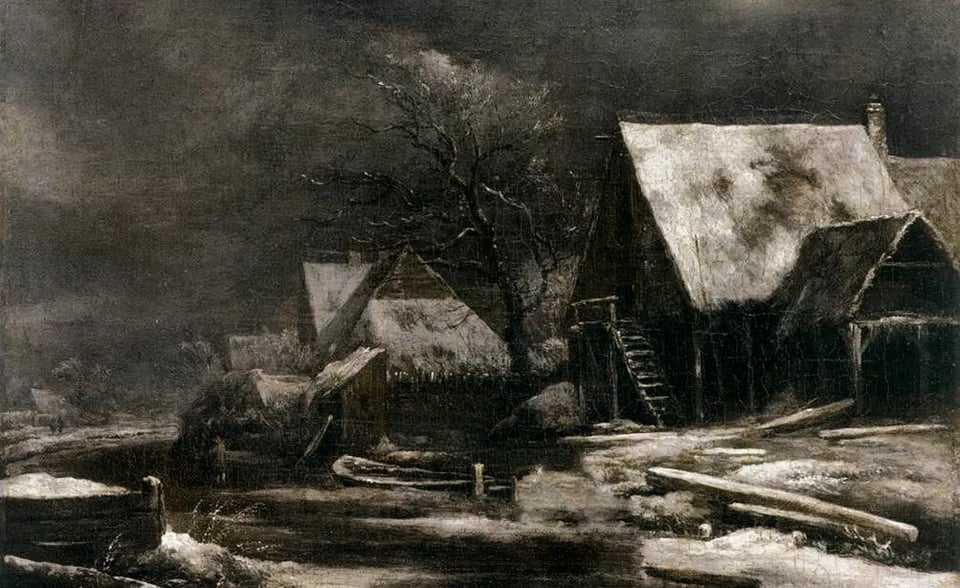
And inside they found the Breadmaster submerged in a massive pile of spilled rye, naked, giggling and waving a wooden spoon. His young apprentice looked on, paralyzed at the absurd scene.
The Breadmaster fell silent and raised his spoon. “The Skeleton Court has laid out their decree and we must obey! They wield the blessing of the Rabid Hound God whose holy foam sustains us. We must harvest the trees of flesh, the finger fruits—we must pluck them. And as we toss the fingers into barrels of bone, they shall show the way!”
“He's gone completely mad,” the King muttered.
“Your grace, whatever shall we do?” the Advisor said, as never before.
“We must remove him, come both of you.”
The three waded into the pile and grabbed the struggling man who kicked and launched the grain about. After an elbow to the Advisor’s face and the King's garment torn, they managed to pull the madman out of the pile and bind him with a rope to the storehouse wall. He kicked and foamed at the mouth, his face red from struggle and madness. “The spout of the Putrid Spring has risen to 40 feet! And so, we must give all of the children's shavings to the Hair Eaters.”
The Breadmaster's raving was so disturbing that the three men didn't immediately notice their arms were covered in a sticky, dark green fungus that seemed to shimmer and bubble. The pile of rye had the dark corruption running through it like veins, and the grain itself even seemed to be tinted emerald when held up to the torchlight.
“The entire pile is contaminated,” said the King in horror.
The Advisor turned to the Breadmaster's Apprentice and grabbed him by the shirt with his ichorous hands. “Did your master eat this grain?”
The Apprentice nodded.
The King ordered that the Breadmaster be locked in the dungeon, and to make an inspection of every stockpile of grain across the kingdom. He insisted that the process was meticulous, and it took ten men three days and three nights. During this time he would go to the dungeon with his Advisor to check on the Breadmaster’s condition. The man had calmed down considerably, but it was clear that he was still mad. He was completely divorced from reality, living in a world alien to the rest of the kingdom. And it became clear that he would not return—his madness was permanent.
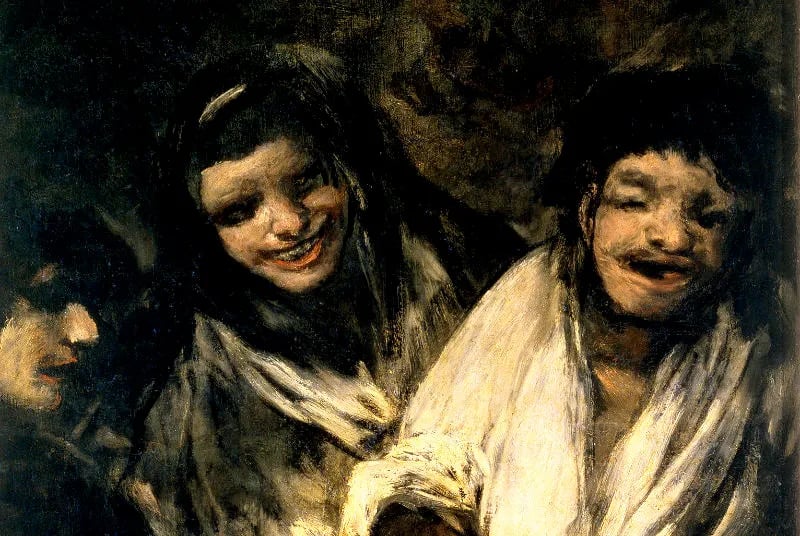
When the grain audit was complete, the King was informed that there was only a small store of uncorrupted rye, only enough for a few men to last the winter. Unless the people of the kingdom ate the madness-inducing grain they would starve and die.
“Perhaps we should save the good rye for ourselves,” said the Advisor. “So that we may remain sane as rulers and make wise decisions.”
The King paused to ponder the suggestion. “But how can we rule over people who don't even inhabit the same reality as us? We won't be able to understand what they are thinking or feeling. There will be forces at work invisible to us. How could we make choices that would best for the people?”
“You're right... and next years harvest may not spare us from the same madness.”
“So, we will all be mad… is this the end of our great kingdom?”
The two pondered the grave implications in silence before the Advisor spoke up. “We could leave ourselves a reminder that what we are experiencing isn’t real. If we are reminded again and again, perhaps there’s hope for the kingdom to one day be restored.”
The two agreed this was the only chance for salvation, and the King issued a decree for every subject in his kingdom to carve an "x" deep into their forehead. When the people would see the scar in the mirror, they would remember they were mad. They would remember that the reality they inhabited was not the true reality.
The story ends there, and Cooper tells us in God is a Verb that it's because we are still living it. We have all eaten the madness-inducing grain and the mark is the voice inside of us that asks “Is this life all there is? Is this all real?”
Last month, I attended the second annual Ghoulish Book Festival in San Antonio and returned inspired by people's love for reading and writing horror/bizarro/weird fiction. This year was even better than last. Not only did I feel a tangible sense of community among my fellow writers, the crowd that came through the free bookstore was charged with more enthusiasm and filled with more beautiful weirdos and queers.
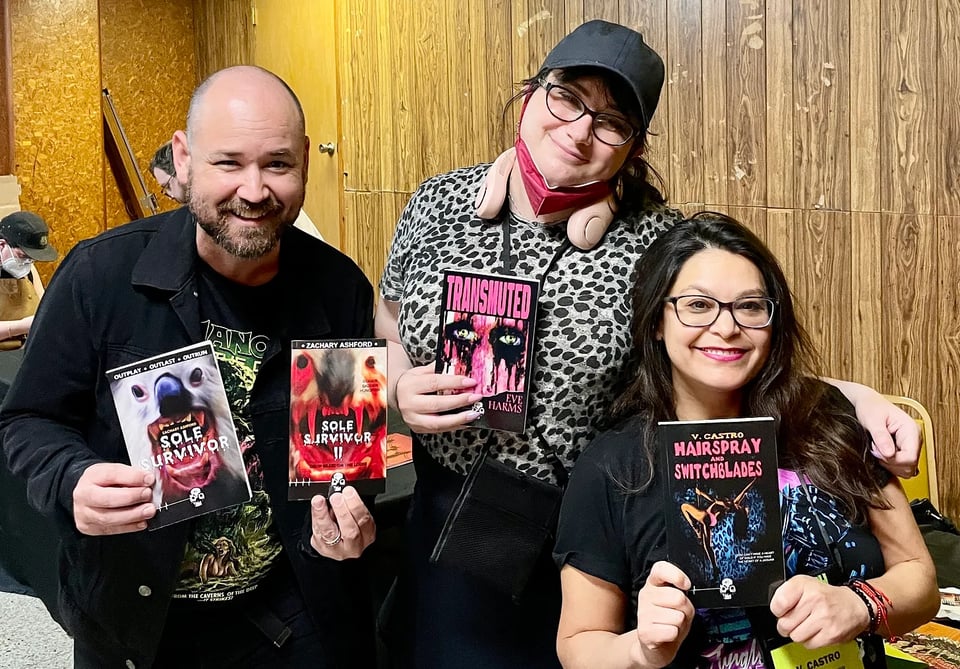
It was especially heartening to see youngsters, accompanied by their supportive parents, enchanted by the vortex of weird and wonder that surrounded them. Though, every time I sold a copy of my queer body horror book TRANSMUTED (that features an explicit mutant sex scene) to a young person I couldn't help but imagine that a bigot or cop would jump out of the shadows and call me a "groomer" before taking me away.
The fear follows me, it fills me. The first year of the festival I was terrified to go, so much that I nearly backed out. During the pandemic I had become “entirely too online”, and spent countless hours reading horrific news and the poisonous words of those who hate people like me. Seeing the world through the lens of twitter, my news app, and other social media sites made me not know what to expect in San Antonio.
Would I be harassed for being visibly trans? For wearing a mask? For peddling obscene materials? This overwhelming fear actually became the deciding reason for me to go last year. I desperately needed a reality check. I didn't know what was real anymore—I spent most of my time in my apartment avoiding COVID and hadn't left Los Angeles in years. And I was relieved, but not exactly surprised, to ultimately be treated well by the people of San Antonio. I had a fantastic time both years.
This last weekend I tabled and taught a workshop at the Spokane Zine Fest which was organized by my friends Chelsea Martin (who just released a novel you must check out) and Ian Amberson. It was another weekend of meaningful connection around a shared love for art. It was like food for my starved soul.
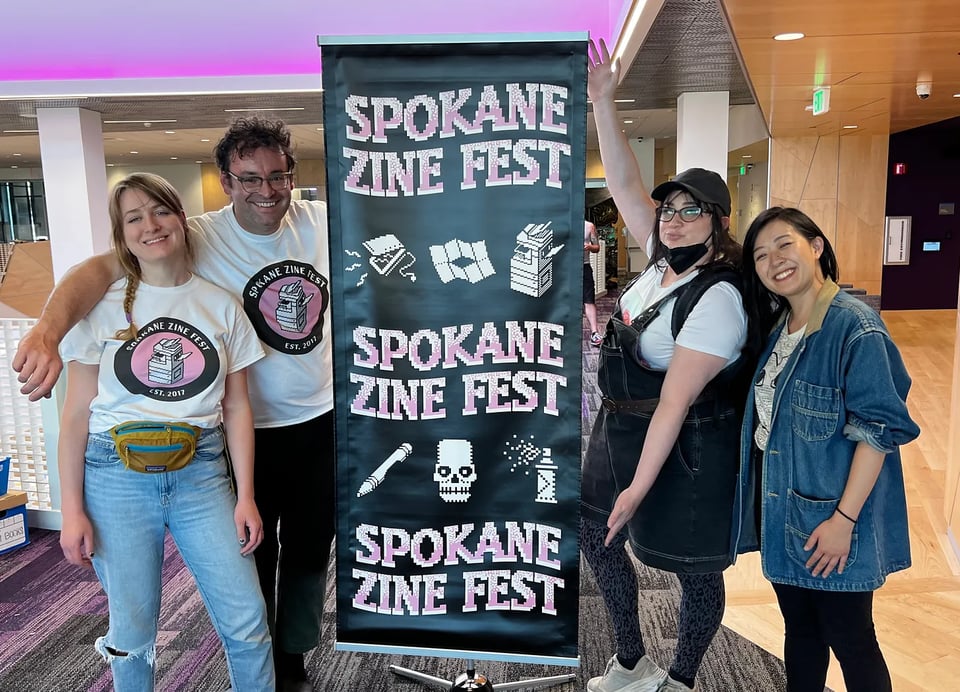
So like last year, I've been reflecting on what I'm bringing into my mind and how it changes my conception of the world around me. I still spend far too much time online and social media. My social network of choice is (was) Twitter, but Twitter is not what it used to be. Some major changes made by the new owner have made the site push more hatred, allow more harassment, and be generally devoid of the aspects that made it worth it despite those things.
Twitter has become a sort of cosmic eldritch horror: you can't look away, for it can warn you of creeping terrors just out of sight but staring into its abyss degrades your body and mind.
While much of what social media shows you is "real" (after all, there is a very real genocidal threat against trans people growing in this country), the world it paints is created by algorithms tailored to incite strong emotions in you—particularly fear and outrage. And while social media connects us1, the algorithm it uses is corrosive to our social fabric and sense of reality.
I was born in the mid-80s so I'm lucky enough to remember a world and a "me" without social media. But I began my transition during the pandemic, during my time of being too-online. So I went through my second adolescence—a period of consuming self-discovery—in this corrosive algorithmic world. At the same time, I was establishing myself as a writer and "building my personal brand". I have been profoundly shaped by the forces of the algorithmic world.
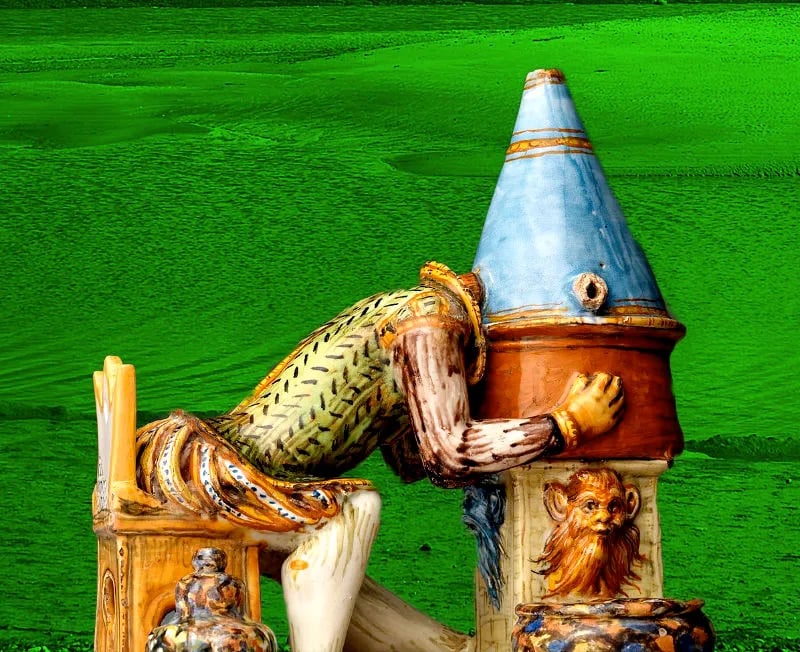
Reader, I am so tired of living in that algorithmic world. I’m tired maintaining a "brand" and presenting myself in a way that fits smoothly into it. And I'm sick of the constant pressure to feed it with "content" and tailor my work to be successful within it. I’m tired of filling my life with “content” instead of art and the people I love. I know a lot of us feel this way, has been writing some great pieces about this social media fatigue, and I think it's part of the reason platforms like Substack are taking off.
Going to the Ghoulish Book Fest and Spokane Zine Fest helped remind me that the algorithmic world that has infected and shaped my mind is false, even if it’s constructed of pieces of reality. It reminded me how important real community and in-person connection is. And coming home hurt. It felt like waking up. I remembered I was mad.
While stories can act as prisms to glimpse a truth, It's important to remember that we cannot touch truth through words or pictures. We cannot touch it through our memories. Every thought is an illusion—the only truth is the present moment. But the present moment doesn't tell us anything, and we are wired to move through the world using stories. So we must rely on our illusions, and enjoy the ones others bring to us. But we must remember we are mad.
How will you remember you are mad?
Thanks for reading 🖤 Eve
The required caveat when criticizing social media is that we recognize the irony that we’ve met so many incredible people on there who we’ve development meaningful connections and friendships with. Which is very true for me as well! I would never have made it to Ghoulish Book Fest without Twitter.
Add a comment: